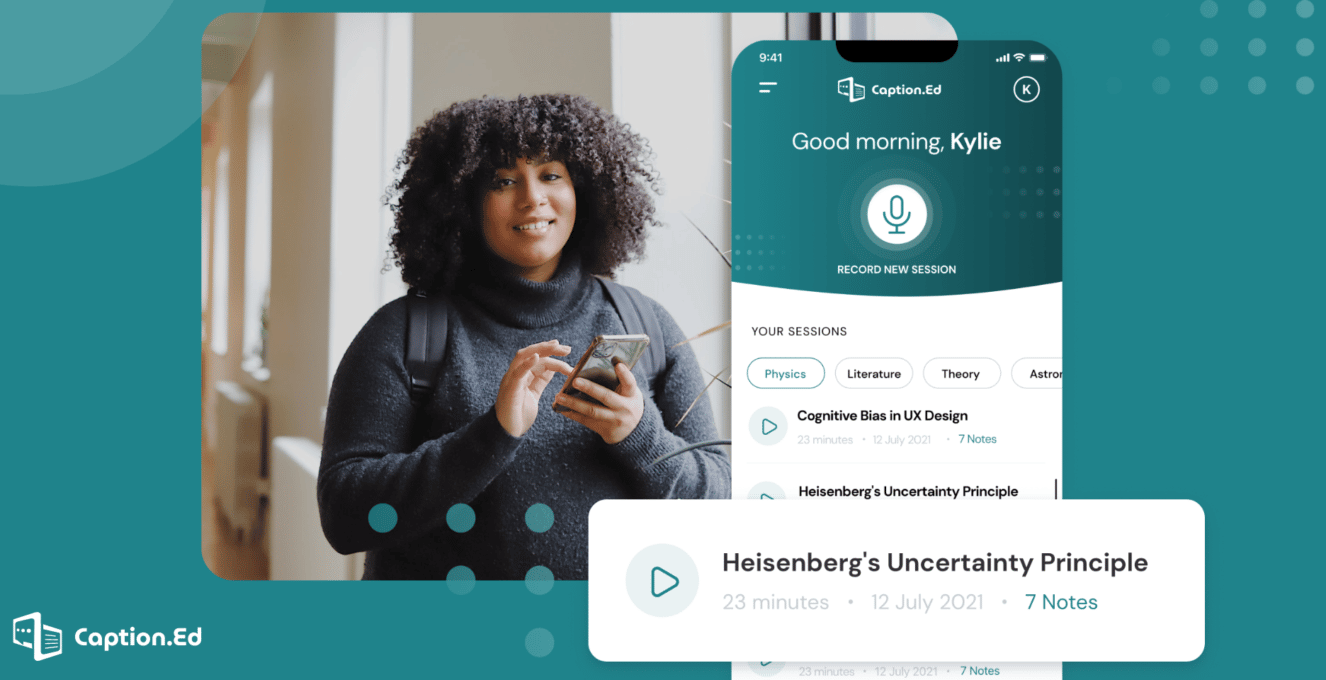It’s no surprise that after long periods of isolation during the pandemic, the number of students diagnosed with anxiety and depression has risen. However, no student should ever feel alone when it comes to mental health. There are many digital tools that can help students take their mental health into their own hands and thrive at university – and Caption.Ed is one of them. Caption.Ed is a piece of assistive tech that provides AI-driven captions and note-taking functionality.
But how exactly can Caption.Ed help students with their mental wellbeing? Let’s explore below.
Students’ Mental Health: The Wider Picture
Taking that first big leap of independence, moving away from home, and transitioning to brand new structures and routines can be a huge trigger for mental health problems, with rates of anxiety and depression being especially high among the student and recent-graduate population.
Almost a third of university students experience serious mental health problems like anxiety and depression, but only 20-30% get treatment. This means thousands of students suffer in silence.
Some early signs of poor mental health include:
- Disengaging from university and activities/hobbies
- Low mood and increased irritability
- Social withdrawal
- Problems with memory, concentration, and logical thought
- Reduced motivation
This list isn’t exhaustive as every student’s experience with mental health will be different. However, it’s vitally important that students seek support if they experience any of the above symptoms.
Looking after mental health and wellbeing is key to students making the most out of university and all the opportunities it brings – and that’s why Caption.Ed is here to help.

Depression
Students with depression often experience a loss of concentration, causing them to miss critical bits of information in their seminars and lectures. This can induce a negative feedback cycle where losing concentration makes depression worse. While it’s normal for students to feel slightly anxious around exam time, not having all the necessary information can pile on added anxiety and stress.
By using Caption.Ed, students who experience these symptoms of depression can put themselves in a stronger position for their studying. For example, Caption.Ed enables students to record the audio and/or video content of both in-person and online lectures. This can help relieve any anxieties the student might have around getting all the information down in one go because everything is being captured and can be referred back to later.
That’s right: all sessions are saved to the Caption.Ed library for students to go back and review in their own time, adding increased flexibility to their studies. Students can also pause and adjust the playback speed to a pace that suits them, reducing the ability of their depression to interfere with their studies by allowing them time to fully absorb and comprehend the content.
Research suggests depression can also make recalling information challenging, negatively impacting students’ learning experience and outlook on their performance at university. However, using captions has been found to stimulate the brain and improve cognition, and for students, this can positively impact their confidence in their abilities and work.
Anxiety
A lecture can span anywhere between one to three hours, and processing information for this time can be cognitively taxing for students with anxiety. Elevated stress hormones such as cortisol and adrenaline can also cause brain fog, leading to forgetfulness and difficulty concentrating.
However, real-time captions enable students to read as they listen – and over 100 empirical studies show that this improves memory. Caption.Ed also provides users with a full transcript after each session, which means that students with anxiety don’t have to worry about staying afloat in a lecture if they find their concentration slipping. This is because Caption.Ed captures everything – a full transcript, audio, video, notes – and saves it in the user’s library ready for them to return to when they need it.
Anxiety can also restrict a student’s ability to take notes effectively – and falling behind can intensify feelings of anxiety. However, Caption.Ed has a ‘flag as important’ and ‘copy across’ function that allows students to highlight key bits of information from their transcript and seamlessly add annotations as they go without having to frantically scribble down notes. All notes are saved automatically, so students can go back and review them anytime and anywhere.
It’s also worth noting that students with specific learning differences, such as dyslexia or dyspraxia, are more likely to experience poor mental health. For instance, a study by UCL finds that poor mental health is more prevalent in children and young people with dyslexia. This means that Caption.Ed not only helps students with anxiety and depression, but can assist students with a large range of learning difficulties too.
Caption.Ed is a great way to assist students with anxiety and depression
Keeping mental health in check is key to students achieving their goals, and that’s why it’s so important that students know they’re not alone when it comes to their mental health. Every student deserves an equal and accessible education – and that’s exactly why Caption.Ed was created. With its captioning and note-taking abilities, Caption.Ed can help students make the most out of their education by lending a helping hand to those who may need it.


